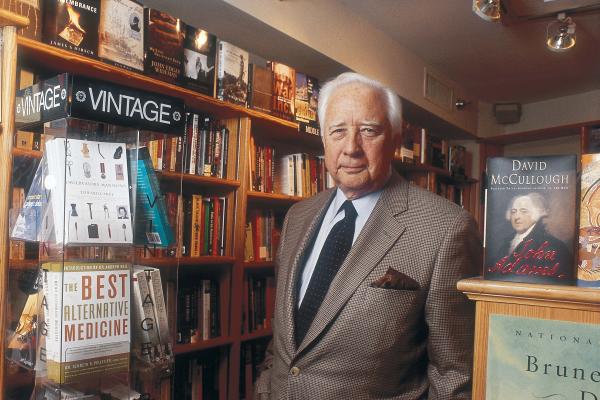NEH Statement on the Death of David McCullough

Photo by Richard Frasier

Photo by Richard Frasier
The National Endowment for the Humanities mourns the passing of famed author and historian David McCullough, 2003 Jefferson Lecturer in the Humanities, a recipient of the Charles Frankel Prize (predecessor to the National Humanities Medal), and an ardent ally of many NEH-supported efforts.
In a Humanities magazine interview with then-NEH Chairman Bruce Cole, McCullough described the fateful Saturday he visited the Library of Congress with his wife and, by chance, saw a collection of photos of the Johnstown Flood in South Fork, Pennsylvania. The photos had been recently acquired and the library’s historical prints curator, Milton Kaplan, had them arranged on a table.
Struck by the violence of the pictures and his own partial knowledge of the flood, McCullough, a journalist then and not yet a historian, wanted to know more. He read a book about the flood. “It wasn’t very good,” he told Chairman Cole. But he soon realized there were survivors of the flood who were still alive and could be interviewed. “And I just knew,” he said, “I’d found what I wanted to do for the rest of my life.”
A central figure in American culture as it relates to the American past, McCullough inspired countless readers with his great narratives of the Johnstown flood, the construction of the Brooklyn Bridge, the lives of Presidents John Adams and Harry Truman, the pivotal year of 1776, the Wright brothers, and many other subjects. He belonged to an important tradition—stretching back to Barbara Tuchman and Francis Parkman—that considered beautiful storytelling an equal partner with scholarship in the enterprise of preserving our history.
In his 2003 Jefferson Lecture, which Candice Millard recently described as “electrifying” in The Atlantic, McCullough put it this way, “History at best has to be literature or it will go to dust.”
In a statement, NEH Chair Shelly C. Lowe (Navajo) said, “David McCullough was not only a great writer and an important historian. He was a missionary spreading passion and love for the American past. He said, ‘history is a larger way of looking at life,’ and he was right. He was also a man of great personal qualities, a friend to NEH and a long list of institutions and individual knowledge seekers whose commitment to knowing our past he shared and treasured.”